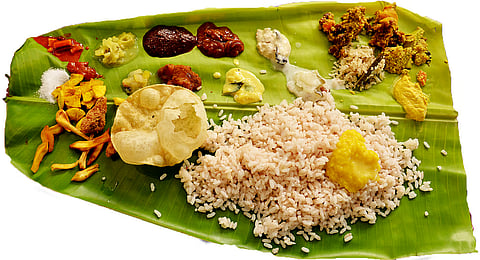
- LIFESTYLE
- FASHION
- FOOD
- ENTERTAINMENT
- EVENTS
- CULTURE
- VIDEOS
- WEB STORIES
- GALLERIES
- GADGETS
- CAR & BIKE
- SOCIETY
- TRAVEL
- NORTH EAST
- INDULGE CONNECT

A few afternoons ago, beneath the soft hum of ceiling fans and the gentle clatter of stainless steel tumblers at Laxmi Coffee House in Noida’s Sector 29, I sat with an old friend, indulging in the rare pleasure of unhurried conversation. We sipped slowly on steaming filter coffee—deep, aromatic, almost meditative—and let the afternoon slip past us in the comfort of familiar company. As is often the case when hearts are open and the table warm, our talk meandered toward food, that most evocative of subjects.
In a moment steeped in nostalgia and gentle longing, I found myself speaking of Marina Balakrishnan—friend, chef, and quiet custodian of Kerala’s vegetarian culinary heritage. From her home in Mumbai, Marina runs Ootupura, a deeply personal kitchen that pays homage to the everyday elegance of Thalassery’s domestic cuisine. Her food, modest in ingredient yet rich in soul, offers no flamboyant declarations—only subtle, fragrant notes that sing of coconut milk and curry leaves, of ancestral rhythms and the lilt of Malayalam drifting from kitchens shaded by banana trees.
I spoke of how such flavours— rooted, nuanced, and disarmingly simple—feel increasingly rare in Delhi. The closest I had come to that quiet grace was in a lovingly prepared meal by Prabhakaran of South Indian World in INA Market, tasted at a friend’s gathering—earthy, honest, and redolent of home.
“You must try Mariyan’s in Mayur Vihar,” my friend Ayandrali Dutta interjected with the spark of someone who knows exactly what you’re missing. A journalist and longtime Noida resident, Ayandrali’s recommendations come seasoned with affection. “It’s a family run place—nothing flashy—but they serve an exquisite sadya, not overpriced, and yes, they deliver.”
Mariyan’s is quietly nestled in the heart of Mayur Vihar Phase 3, its presence unassuming yet significant. With the sacred Uttara Guruvayurappan Temple anchoring the Malayali community in nearby Phase 1, this corner of East Delhi has become a tapestry of southern sensibilities. Eateries like Mariyan’s rose from within the community, built not for trend, but from the yearning to preserve a culinary memory and share it with the city at large.
“They do the most comforting ghee rice with mutton or prawn sukka,” Ayandrali continued. “The kizhi parotta is indulgent, and the biryani—flavourful and generous. The portions alone speak of their hospitality.”
Intrigued, I visited one languid Saturday afternoon. It was well past three, and the modest dining room was quiet save for a Malayalam film playing softly from a wall-mounted television. It was well past three, the post-lunch lull had set in, and the modest dining room was quiet save for the sound of a Malayalam film playing softly from a small television mounted high on the wall. We were welcomed without ceremony and encouraged to linger—no clock-watching, no table-turning. The mood was unhurried, comforting.
Though their menu leans favourably towards non-vegetarian dishes, there was warmth enough for vegetarians like me. A generous mound of rice arrived on a gleaming steel plate, accompanied by a humble yet harmonious medley of sambar, egg roast, green peas curry, and a delightfully tangy pineapple pachadi. It was not a meal that sought praise—it simply asked to be eaten, slowly and appreciatively.
For Chef Agnibh Mudi, who grew up in Mayur Vihar, such places are not mere eateries but markers of memory. “Our go-to was Neelgiris,” he recalled. “It shut during the pandemic, but new food carts sprang up—serving fresh dosas from dawn, bottomless chutneys, people queuing with banana leaves in hand.”
He also spoke of Kerala Café in Phase 1— once an institution for the homesick Malayali, and increasingly for discerning Delhiites. Whether it’s puttu and kadala curry or egg roast with matta rice, the food is nourishing, unfussy and honest. Over time, its modest reputation grew, drawing in those who value integrity on the plate. “Their mutton pepper fry with appam was one of my goto dishes,” recalls Mudi.
In these quiet corners—on humble plates, in steamy kitchens, through the hands of cooks guided by memory—there exists a quiet revolution. A reclaiming of roots. A preservation of taste, not for novelty, but for continuity. Here, food becomes more than sustenance. It becomes a gentle act of remembrance. A fleeting, fragrant return to home.